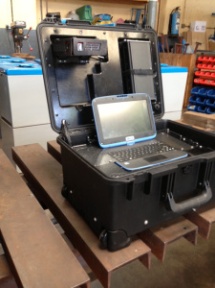
I just came across some news on MobiStation in Uganda and the first thought I had was that is a good example of another good appropriate technology initiative destined to fail.
Every year, UNICEF sends out millions of School-in-a-Box kits for children affected by emergencies. Exercise books, slates, pencils, rulers, and other learning materials enable a teacher and up to 80 students, taught in double shifts of 40, to create an instant classroom – no matter where they are. Originally designed for refugees following the Rwanda crisis of 1994, School-in-a-Box has become the hallmark of UNICEF response in disasters. Twenty years later, in the era of Information Technology, UNICEF is pioneering a new type of digital School-in-a-Box.
MobiStation, developed by UNICEF Uganda, is a solar-powered multimedia kit complete with a laptop, projector, scanner, and speakers, all contained in a portable suitcase. Detailed content in this article. It works by projecting e-books, teaching videos, and other multimedia content in rural schools and health centers, bringing quality learning to marginalized groups. The educational content for MobiStation is developed and recorded by the country’s top teachers in subjects like English, math, social studies and science.
Although a great tool – a 21st century answer to the School-in-the-Box – has been developed, implementation will head for failure in Uganda. According to the information in the news flash MobiStation will address “…some of the biggest challenges of the education system: teacher absenteeism, poor-quality instruction, and lack of textbooks.”
A classical mistake!
Technology is not going to solve political and social problems. Teacher absenteeism will not disappear with the MobiStation. Instruction will not be …………….. better! Alright? (all people in Uganda know what I mean here). Lack of textbooks? How is MobiStation going to provide textbooks for classes of 100 students that have hardly pen and paper?
The educational system in Uganda – like many African countries – is sick to the bone. Teachers stay home because they are not being paid in spite of all promises. Schools are run like prisons, corporal punishment and humiliation are rampant and a situation is created where neither staff nor students are motivated. There is no drive to innovate teaching methods in this environment. Government is looking away when it comes to individual schools. They rather like to impress donors with hollow phrases like “to provide for, support, guide, coordinate, regulate and promote quality education and sports to all persons in Uganda for national integration, individual and national development”.
If these basic conditions are not improved, MobiStation is not going to change anything in Uganda. The MobiStation is just going to end up as the private home cinema center for the headmaster.
Technologists are sometimes remarkably poor thinkers when it comes to social change. They forget that technology may support change but it will never bring about change. Change comes from individuals, social systems, governments, not from technology. So if they believe that MobiStation will change Uganda, I am certain that this will become a great story for the next ICT4D Failures conference.
Is MobiStation a good tool? YES, it is marvelous tool but to be used in emergency situations where schools have collapsed, libraries burned, but motivated teachers are on the ground. MobiStation will support these teachers to keep their students in ‘school’, to assure that the lives of the young school kids remains a bit ‘normal’ and it will bridge the gap until schools are being rebuilt. So, let’s forget about Uganda and see what the MobiStation can do in Gaza, the Central African Republic, Syria etc.


Thank you. This is what I was thinking too.
Thanks Wayan. Please share. It is the same old mistake, over and over again.
Great post, I agree with most of it…except for the “technologists are poor thinkers when it comes to social change” part. I can’t think of any that I have worked with that would recommend MobiStation for those purposes in that context…or in Gaza, the Central African Republic or Syria without taking a look at the budget first and considering the alternatives as well (the only document with a dollar sign on it that I could find was this: http://bit.ly/1l9z35g). I looked into it a bit further and discovered that the person who appears to be responsible for the pilot has a background in international affairs and sociology, not tech or anything directly related to primary/ secondary education in terms of actual practical experience…I guess it all depends on how rigidly the term “technologist” is being applied here:-). It might have been an idea to more directly involve techies and teachers in designing and implementing the pilot as well; not just in procuring equipment and producing content for it.
Ha! Well, there are many technologists who think of the tech first, but to your point, there are usually more non-techies who get myopically focused on a specific tech design and forget context. My favorite is the current thought that every mobile intervention has to be SMS – forgetting voice, USSD, etc, much less the cost of SMS.
Benita, Wayan words it nicely. I refer to an old discussion, especially in ICT4D. And yes, not all techies are blind and there are who see the wider context.
Agree! Or that USB sticks are changing computing paradigms… To your point I think I have also been pretty lucky so far in terms of the technologists that I have had the opportunity to work with. Touch wood!
I think he does too. I was referring to this specific discussion, in the context of ICT4E – if you have any links to the old discussion on ICT4D it would be great so I can brush up on it. Thanks! 🙂
I find it funny that people still hold the notion that innovation will always have to wait for all political, economic and social conditions to be ‘perfect’ before it’s deployed.
Mobistations are a great resource and have actually served a vital role of continuous medical training and education for health workers in rural areas,
Unlike before, these people do not have to leave their work stations to travel to country capitals to get on-going job training.
Low cadre health workers have also been able to use this platform to consult senior doctors and pharmacists remotely.
Much as it may not solve all the problems that need to be taken care of, it is a step in the right direction.
MobiStation is an interesting gadget and I see use for it. I also state that at the end of the posting. But do not think that it will solve the problems in the educational sector of Uganda (or Africa), as the initiators want us to believe.
there is alot to do up to a point you introduce technology. There must be a need for one to introduce any solution.
If technology is introduced at the right time it will certainly work. when ATMs were introduced there was alot of fear that people will fail to use it but now it works, the same for mobile money. These solutions are addressing people’s needs.
For example, If swipe cards are introduced for cheap public transport people will embrace it because it is addresses their need. These solutions will work for all of us regardless of the situation and background.
Back to the point, much as there are schools that have reached that point to introduce technology, it cant be considered as a general solution to improving the quality of education. there is need to address other problems that could even fail technology when it is availed.
I agree that computers and (open) digital learning content can contribute a lot to education, everywhere. However, the basic conditions need to be right (teacher availability, motivation, infrastructure etc) in order to make the introduction of technology a success. To illustrate with your own examples: Do not think that ATMs will eradicate poverty and that swipe cards in public transport will make the trains and buses run. If you think so, you are on the wrong track.
Great piece but missed one thing; that quality of life depends on variety in choices. None of these technologies can change any thing much when applied in isolation. I see them adding flavour to any processes under which they are deployed. Its fallacious to apply sweeping generalisations to what has contributed even to the media we are currently using. I don’t think all our problems of social networking and communication have been solved by now.
Otim, you are so right. Quality of life is often outside focus.
Great innovation but before the MobiStation project can even start, teachers’ capacity to use it must be built and they must have faith in its effectiveness. Otherwise even when given, it will just gather dust somewhere.
Bottom line: sensitise and build capacity of teachers to run MobiStation, do a pilot to iron out bottleneck before full scale roll-out.
Margaret, you hit the nail on the head!